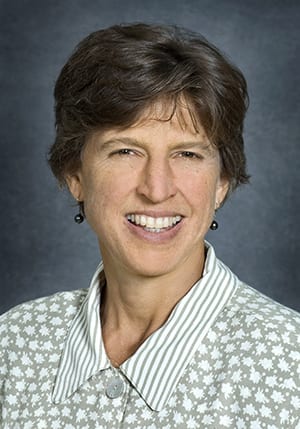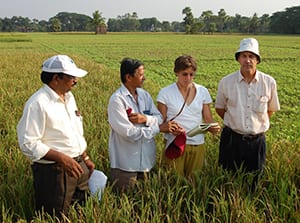News
5 Questions with Pamela Ronald
Pamela Ronald, a rice geneticist at the University of California, Davis, and a member of the Boyce Thompson Institute Scientific Advisory Board is on the forefront of educating the public about plant genetics, food security and sustainable agriculture.
In her day job, Ronald researches the genetic basis for tolerance to stress and disease in rice; a staple crop that feeds half of humanity. But outside the lab, she speaks publicly about sustainable farming, crop improvement and food security and has authored a book on the subject, called Tomorrow’s Table: Organic Farming, Genetics, and the Future of Food, with her husband, organic farmer Raoul Adamchak.
In March, Ronald presented a TED talk entitled “The Case for Engineering Our Food.” With more than one million views, Ronald’s engaging talk is moving forward the national conversation on plant genetics.
After the success of your TED talk, are you beginning to feel like a poster child for genetically modified organisms (GMOs)?
I hope not! I don’t consider myself a poster child, and I certainly don’t consider myself “pro-GMO.” I support genetic tools and farming practices that enhance sustainable agriculture. Sometimes, genetically engineered crops are useful, but that’s just one component of a productive and healthy farming system.
When did you start speaking publically about genetically improved foods?
My husband and I wrote a book that was published in 2008 about sustainable agriculture, organic farming, food security and plant genetics. Since that time, we’ve been speaking more publically. But even before that, I had been teaching a class called “Genetics and Society” here at UC Davis for undergraduates. An editor asked me if I would write a book about all aspects of genetics and society. I felt it was very broad—probably too broad and outside my expertise—so I recruited my husband to write a more ag-oriented book, which is of course where we feel most comfortable.
How have questions from the media changed over time? Do you think public opinion is shifting on genetically improved crops?
There are many excellent journalists, at the New York Times and other respected newspapers, who are finally putting out accurate information about plant genetics. That’s going to have a big effect. There’s often a lag between journalism and science, which is kind of typical with science-based issues. We saw that with autism in a big way for many years. Many of the major newspapers reported that there was a link between autism and vaccinations and those articles persisted, for many years sometimes, after the link had been completely discredited. But now, there are very few major newspapers that would report that link based in science.
I think we are starting to see that when it comes to plant genetics. Groups that reject science will never go away because there’s always going to be a very outspoken segment that will accept some science and reject other science. But I think that as plant geneticists, we want to reach the large proportion of the population that wants to advance sustainable agriculture.
What, if anything, should scientists be doing to improve public understanding of genetically altered crops?
What I find is really helpful is if you just talk to your friends. One-on-one conversations help people dissect the issues. Often people have all-or-nothing ideas about “GMOs,” but of course, each crop, whether it’s developed through genetic engineering or another technique is different. So I think teasing it apart with friends and family really helps a lot.
With regard to engineered crops, what do you think is the role of philanthropy in plant research?
There’s a huge amount of work that needs to be done to help subsistence farmers and small farmers and I think that’s where philanthropy can help a lot. For-profit companies in the U.S. are generally not going to fund research that is going to benefit subsistence farmers because, they need to profit from seeds that they’re selling to farmers in developed countries. Some of our public institutions—NSF, USDA—they’re interested in funding basic research, but often there’s a gap between basic and applied research. Filling that gap will benefit subsistence farmers and all of us.




